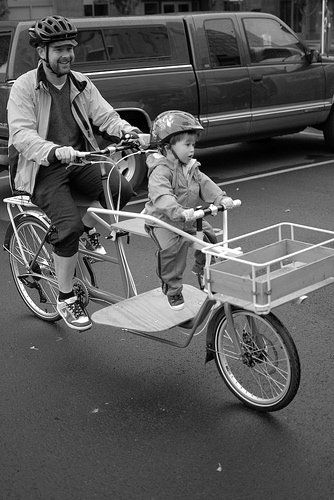 You have to give the car credit. It’s wormed itself into every aspect of our lives, becoming a workhorse, commute-necessity and pleasure-boat in equal measure. We need the car to shop, to work, to go to school, to hit the movies, go on vacation, or to pick up a date – even many a parent can point to the backseat as the answer to the kid’s perennial questioning of ‘Where did I come from?’ In short the car is indispensable.
You have to give the car credit. It’s wormed itself into every aspect of our lives, becoming a workhorse, commute-necessity and pleasure-boat in equal measure. We need the car to shop, to work, to go to school, to hit the movies, go on vacation, or to pick up a date – even many a parent can point to the backseat as the answer to the kid’s perennial questioning of ‘Where did I come from?’ In short the car is indispensable.
Or is it? We may have built much of our lives around personal car use, but the age of the auto has only been with us for some five decades. For most of the rest of the 99.99% of human endeavors, we managed fine, without a personal internal combustion engine. The reliance, as with many of the ills wrought by society today, really starts in our heads. But to throw off that reliance only requires a suitably-sized leap of imagination.
Of course, you could carry on with the mantra of driving ecologically, of purchasing the lowest emissions car, or even going electric. Anything to keep the car at the core of your kinetic modern life, rushing from place-to-place. Now, trimming the corners of your car-habit does help, of course – every little does, as they say. But a lot helps a great deal more, and consigning your automobile-dependency to the past would make a massive difference to the burden you place on the planet – and even more to your personal load.
So it’s time to get radical, and to plan for the possibility of going car-less. But first you need to break the neck-lock that the car has over your life. Rather than cherry-picking the pro’s of the auto only, try and open your eyes to the cons. Then you may appreciate why the car is in fact a millstone; and why losing it could be the start of a liberating journey.
The most obvious burden that the car lays on us is a financial one. Cars are something you pay through the nose for, whether you use them or not. There’s the money to finance purchasing them, money for taxes and repairs, cash for servicing bills and insurance costs – these all take a significant chunk out of our monthly wage check. According to the Bureau of Labor Statistics, the average annual household expenditure on cars is nearly $5400 – before any gas is put in the tank!
So if you cut the car, the first sign of liberation will be a fatter wallet. And that money can be put to no end of good uses. But of course another of the significant benefits is that you will no longer be a guilty-party to a carbon-fest that’s drawing us towards climate melt-down. Road traffic contributes 27% to total US carbon emissions, according to a recent report from the International Transport Forum. Without a car, though, your share will be zero – and you’ll have the planet and future generations breathing a sigh of relief. Even better, you’ll be relieved of the that feeling that you’re part of the problem – and start to appreciate how liberating it is to be part of the solution.
Then there are the subtle drags the car puts on your life. The first is the cramping of your physical health, from using those four wheels as leg-substitutes. You are condemning your body to a slouched stressed inactivity. As the writer Schumacher once said, ‘reliance on automation is self-imposed impotence.’ If you begin to rely on foot or pedal power instead, you will rediscover the pleasures of working your body to the rhythm of exercise, as you get from A to B.
And because you are no longer trapped in a pressed-steel shell, the world is suddenly accessible to you, out and about on your travels. That helps demolish that other prison that cars have locked us into – a mental and social alienation. To walk is to talk and meet – to become woven back into a forgotten social fabric. To cycle is to explore, and see the world on your terms – not those of the stuttering queues of traffic that cars build around themselves.
On so many different levels, once you dig deeper into the love-affair with the car, you’ll find the seamy underside that corrodes society, and traps individuals. If you can be bold and daring enough to think outside the box, you could find that life without a car is far from hell – it could be the road to freedom.
Jonathan is a personal trainer from Minnesota. He is currently working on his website which offers high quality kettlebells for sale. His website can be found at Kettlebells4sale.com
Photo: ![]()
![]() Some rights reserved by grrsh
Some rights reserved by grrsh
We’ve been car-free for 8 years. One of the most common things I’ve heard people say to me is that they couldn’t live without their car because their car equals freedom to them. Yet when I think of the possibility of getting a car again, I just feel burdened.
I like the term car-free better, as it indicates choice. But in much of the US (outside major cities and their transit infrastructure) it is hard going without a car. Planning has historically been about moving cars, not people.